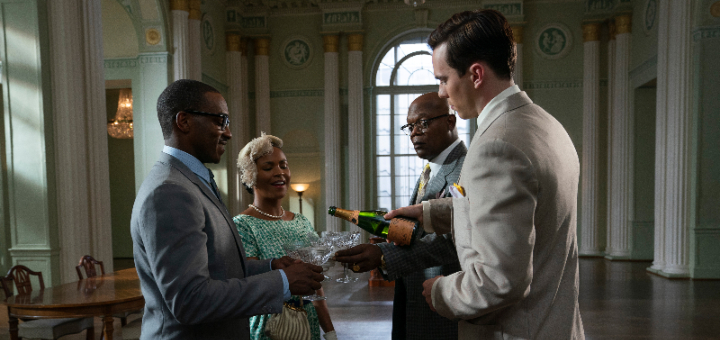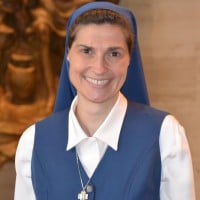
 Sr. Nancy, George Nolfi, Sr. Rose. Photo by author.[/caption]
With the passing of time, stories surface that question our very humanity as we look back at our mistakes and triumphs as a society, as a human family. Some of those stories take ever so long to come to the collective societal consciousness, but when they do, they beg us to examine our own motivations, beliefs, and innate prejudices. Director George Nolfi (The Adjustment Bureau) teams up with producer Joel Viertel and AppleTV+ to bring forth a tale that is as big as it is true in the release of The Banker. Nolfi calls this story, “a celebration and critique of capitalism.” The story is set in the late 1950s and early 1960s Los Angeles and centers on the smart and savvy African-American businessmen Bernard Garrett (Anthony Mackie) and Joe Morris (Samuel L. Jackson). Garrett develops a genius for numbers at a young age and listens in on conversations of businessmen speaking about real estate investments. Mackie says of his character, “He knew then that he wanted to make money the way bankers make money.”
Garrett moves with his wife, Eunice (Nia Long), a sensitive and intelligent woman, and their son from Texas to Los Angeles, a less racist society, where he hopes to try his hand at the real estate market, foreseeing the migration of blacks to Los Angeles. He starts by buying up apartment complexes in white neighborhoods for black doctors, teachers, and lawyers who wanted to move out of the ghettos. After some successes and big missteps, Eunice introduces him to the street smart, wealthy jazz club owner and real estate mogul, Joe Morris. They quickly become a force to be reckoned with, changing the racial landscape of Los Angeles.
Sr. Nancy, George Nolfi, Sr. Rose. Photo by author.[/caption]
With the passing of time, stories surface that question our very humanity as we look back at our mistakes and triumphs as a society, as a human family. Some of those stories take ever so long to come to the collective societal consciousness, but when they do, they beg us to examine our own motivations, beliefs, and innate prejudices. Director George Nolfi (The Adjustment Bureau) teams up with producer Joel Viertel and AppleTV+ to bring forth a tale that is as big as it is true in the release of The Banker. Nolfi calls this story, “a celebration and critique of capitalism.” The story is set in the late 1950s and early 1960s Los Angeles and centers on the smart and savvy African-American businessmen Bernard Garrett (Anthony Mackie) and Joe Morris (Samuel L. Jackson). Garrett develops a genius for numbers at a young age and listens in on conversations of businessmen speaking about real estate investments. Mackie says of his character, “He knew then that he wanted to make money the way bankers make money.”
Garrett moves with his wife, Eunice (Nia Long), a sensitive and intelligent woman, and their son from Texas to Los Angeles, a less racist society, where he hopes to try his hand at the real estate market, foreseeing the migration of blacks to Los Angeles. He starts by buying up apartment complexes in white neighborhoods for black doctors, teachers, and lawyers who wanted to move out of the ghettos. After some successes and big missteps, Eunice introduces him to the street smart, wealthy jazz club owner and real estate mogul, Joe Morris. They quickly become a force to be reckoned with, changing the racial landscape of Los Angeles.
 Image credit: © 2020 AppleTV+. All rights reserved.[/caption]
Having faced continual rejection by banks to obtain loans because of his race, Garrett tells Morris that they need to help the blacks get loans to start businesses and buy houses, but the only way they can do that is by buying the tallest building in downtown Los Angeles, The Bankers Building, where multiple banks rent space. By owning the building they can be around banks to understand and challenge their loaning policies. In order to do this they needed someone who would be the “white face” of the business, since blacks were still not taken seriously in this capitalist society. They pull in Matt Steiner (Nicholas Hoult), a former football star who worked in construction. He was to be the “face” of the business to the current building owner and bank mangers. They teach Matt everything from complex math calculations, high finance, golf, table manners, business lingo, and how to dress. With this scheme, they successfully buy The Bankers Building, the most expensive real estate in Los Angeles. They become unstoppable, owning up to 177 buildings.
Garrett is impelled to help the blacks in his hometown in Texas so he convinces Morris to buy the Mainland Bank in Texas where the Jim Crow laws were enforced. They did this with Steiner as their front man but with Garrett and Morris donning janitor and chauffeur uniforms as disguises. Steiner gets cocky and wants to be a partner in the business rather than managed by Garrett and Morris. He convinces them to buy another bank in Texas that he can run on his own. After a series of missteps, his downfall becomes apparent, but takes down Garrett and Morris as well. With a surprise ending, Garrett and Morris leave no detail unattended.
Image credit: © 2020 AppleTV+. All rights reserved.[/caption]
Having faced continual rejection by banks to obtain loans because of his race, Garrett tells Morris that they need to help the blacks get loans to start businesses and buy houses, but the only way they can do that is by buying the tallest building in downtown Los Angeles, The Bankers Building, where multiple banks rent space. By owning the building they can be around banks to understand and challenge their loaning policies. In order to do this they needed someone who would be the “white face” of the business, since blacks were still not taken seriously in this capitalist society. They pull in Matt Steiner (Nicholas Hoult), a former football star who worked in construction. He was to be the “face” of the business to the current building owner and bank mangers. They teach Matt everything from complex math calculations, high finance, golf, table manners, business lingo, and how to dress. With this scheme, they successfully buy The Bankers Building, the most expensive real estate in Los Angeles. They become unstoppable, owning up to 177 buildings.
Garrett is impelled to help the blacks in his hometown in Texas so he convinces Morris to buy the Mainland Bank in Texas where the Jim Crow laws were enforced. They did this with Steiner as their front man but with Garrett and Morris donning janitor and chauffeur uniforms as disguises. Steiner gets cocky and wants to be a partner in the business rather than managed by Garrett and Morris. He convinces them to buy another bank in Texas that he can run on his own. After a series of missteps, his downfall becomes apparent, but takes down Garrett and Morris as well. With a surprise ending, Garrett and Morris leave no detail unattended.
 Sr. Rose Pacatte, Nia Long, and Sr. Nancy. Photo by author.[/caption]
An important note in this film is the character of Eunice Garrett, played brilliantly by Nia Long. She is not only the wife of the genius Bernard, but also his fellow business partner whose shrew intellect and unwavering trust gives Bernard the impetus to carry on. Her grace and dignity are her strength and she challenges her husband when he makes a derogatory comment on her being a woman and responds that it is no different what he says than how others treat him because he is a black man. She is fierce but kind, supportive but also challenging.
It is fascinating that in the laurels of history these men were recognized only when they were caught and the national newspapers reported the scenario. It causes us to pause and reflect today to examine whether our society has changed enough since the 1960s. Are we more accepting of others different than ourselves? Do we live with compassion and understanding? Is the “American Dream” truly for all Americans? This film is a, “catalyst for change,” as Nolfi would put it. You cannot remain unchanged after experiencing this incredible story. At its root, it calls us to fight injustice at all levels of society in all fields of work for all races. If we are to be, “one nation under God” then the challenge is to live so as brothers and sisters, children of God, treating our neighbor as we wish to be treated, as Jesus teaches, for as our Constitution states, "all men are created equal." This film challenges us as a society at our very core.
Sr. Rose Pacatte, Nia Long, and Sr. Nancy. Photo by author.[/caption]
An important note in this film is the character of Eunice Garrett, played brilliantly by Nia Long. She is not only the wife of the genius Bernard, but also his fellow business partner whose shrew intellect and unwavering trust gives Bernard the impetus to carry on. Her grace and dignity are her strength and she challenges her husband when he makes a derogatory comment on her being a woman and responds that it is no different what he says than how others treat him because he is a black man. She is fierce but kind, supportive but also challenging.
It is fascinating that in the laurels of history these men were recognized only when they were caught and the national newspapers reported the scenario. It causes us to pause and reflect today to examine whether our society has changed enough since the 1960s. Are we more accepting of others different than ourselves? Do we live with compassion and understanding? Is the “American Dream” truly for all Americans? This film is a, “catalyst for change,” as Nolfi would put it. You cannot remain unchanged after experiencing this incredible story. At its root, it calls us to fight injustice at all levels of society in all fields of work for all races. If we are to be, “one nation under God” then the challenge is to live so as brothers and sisters, children of God, treating our neighbor as we wish to be treated, as Jesus teaches, for as our Constitution states, "all men are created equal." This film challenges us as a society at our very core.
 Image credit: © 2020 AppleTV+. All rights reserved.[/caption]
Image credit: © 2020 AppleTV+. All rights reserved.[/caption]
Copyright 2020 Sr. Nancy Usselmann, FSP First published at bemediamindful.org.
About the Author

Sister Nancy Usselmann, fsp
Sr. Nancy Usselmann, FSP is a Daughter of St Paul and the Director of the Pauline Center for Media Studies in Los Angeles, CA. She is a Media Literacy Education Specialist, theologian, international speaker, film reviewer, and blogger for BeMediaMindful.org. Her book A Sacred Look: Becoming Cultural Mystics is a theology of popular culture published by Wipf & Stock Publishing.


.png?width=1806&height=731&name=CatholicMom_hcfm_logo1_pos_871c_2728c%20(002).png)
Comments